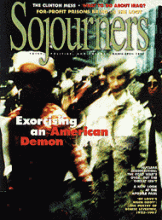Oscar time is a'coming, and with it another chance to consider the relationship between Steven Spielberg's world and our own. Once again the poet laureate of the Phoenix suburbs has swung for the fences with a big humanitarian historical epic that leaves no emotional button unpushed.
Last time out, with Schindler's List, Spielberg took on the emblematic evil of the 20th century—the scientifically efficient, industrialized, assembly-line slaughter of the Jews by the Nazis. Now, with Amistad, he's stepped back to consider the racist crime of the 19th century—the African slave trade.
In both cases Spielberg, the perpetual optimist, finds in history's field of blood and bones the one small story where the good guys won. This is important because today's mass movie audience absolutely requires a happy ending. Life may be ambiguous, or even tragic, but if you film it that way no one will see it. Tragedy is box office death. But the stories of Schindler—the savior of Jews who got away—and the Amistad Africans—who fought the power and won in court—allow the dreamworker to show the full horror of history and still deliver that third act uplift.
Of course, the mandatory happy ending comes naturally for Spielberg. In fact he was associated with many of the action-bloated blockbusters of the late '70s and early '80s that so dumbed down (or numbed out) the movie audience (think Jaws, think Indiana Jones). By making such unprecedented buckets of money, those movies effectively killed off a Golden Age of cinematic experiment (ruled by the likes of Altman, Scorsese, and Coppola) and brought back the one-dimensional celluloid hero.
Read the Full Article
